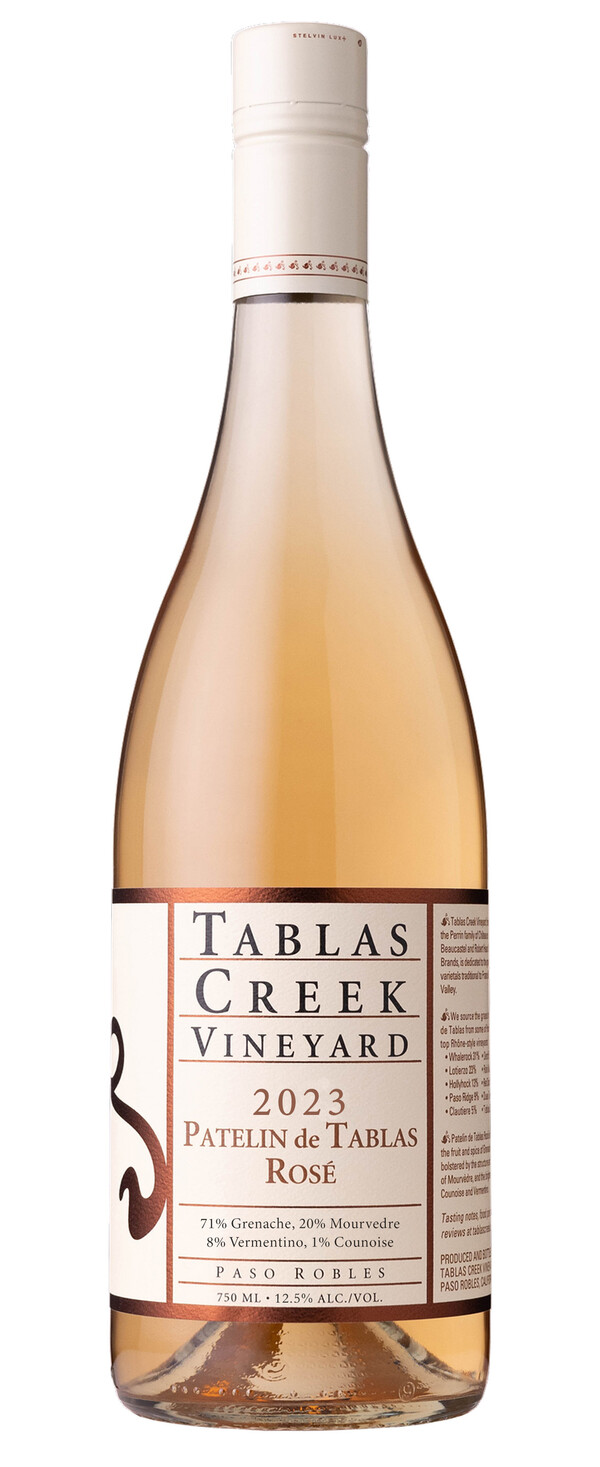
2023 Patelin de Tablas Rosé
It looks like there was a problem contacting the store. Please try reloading your browser. If the problem persists try contacting us at orders@tablascreek.com
The Tablas Creek Vineyard Patelin de Tablas Rosé is a rosé blend in the tradition of Provence, produced from three red Rhône varietals: Grenache, Mourvèdre, and Counoise, with an addition of Vermentino. The wine incorporates fruit from eleven top Rhône vineyards in Paso Robles, each vineyard selected for its quality. Like most rosé wines from the Rhône Valley, it is based on the bright strawberry fruit and fresh acidity of Grenache, with additions of deeper red fruit and structure from Mourvèdre, spice from Counoise, and citrusy lift from Vermentino -- a white grape that is increasingly important in many Provence rosés.
-
92 points; "Fresh and vibrant Provencal-style rosé": JamesSuckling.com (Sep. 2024)
-
92 points; "If you’ve got the thirst, this will finish it off.": Wine Review Online (July 2024)
-
93 points; "peach, watermelon and rose petal aromas hold their poise for days": Wine Enthusiast (June 2024)
-
92 points; "chalkiness through the core with fine citrus crispness": Purely Domestic Wine Report (May 2024)
-
96 points; "Medium-bodied and perfectly balanced with a vibrant texture ... our favorite Patelin de Tablas Rosé to date": BevX (Apr. 2024)
-
92 points; "flavours of blood orange and early-season wild strawberries play alongside crushed slate, ripe raspberry and just a faint whisper of garrigue": Decanter (Apr. 2024)
-
91 points; "bright and beautiful": Owen Bargreen (Apr. 2024)
-
91 points; "juicy and energetic display": Vinous (July 2024)
Tasting Notes
A pretty peach color, a touch deeper than most recent vintages. On the nose, vibrant aromatics of fresh nectarine, wild strawberry, and jasmine. The mouth is rich with fruit but dry and bright, with flavors of strawberry tart and salted watermelon, vibrant acids, and a mouth-watering finish with notes of yellow raspberry and rose petals.
Technical Details
Appellation
- Paso Robles
Technical Notes
- 13.0% Alcohol by Volume
- 5250 Cases Produced
Blend
- 71% Grenache
- 20% Mourvedre
- 8% Vermentino
- 1% Counoise
Recipes & Pairings
Recipe Suggestions
Food Pairings
- Salmon
- Sushi
- Anchovies
- Sausages
- Fried chicken
- Mediterranean tapas
Production Notes
Grapes for the Patelin de Tablas Rosé are sourced from seven Paso Robles appellations. Three are rich in limestone: the warmer, higher-elevation Adelaida District near Tablas Creek, the cool, coastal-influenced Templeton Gap to our south, and the moderate, hilly El Pomar to our south-east. These regions provide structured, mineral-laced fruit and excellent acidity. The moderate-to-warm Creston, Geneseo, San Miguel and Estrella areas east of Templeton produce grapes with generous fruit and spice.
The 2023 vintage began with our wettest-ever winter, replenishing ground water and delaying budbreak. It continued with our coolest growing season in more than a decade, which combined with the late start to produce a harvest roughly a month later than most recent years, beginning in mid-September and not concluding until mid-November. Warm, sunny weather starting in October allowed the later-ripening varieties to reach full maturity. The exceptionally long hangtime and gradual ripening combined to produce fruit with deep colors, remarkable intensity, and noteworthy vibrancy. We believe 2023 has all the hallmarks of a blockbuster year.
The bulk of the Patelin de Tablas Rosé is Grenache, supplemented with Mourvèdre, Counoise, and Vermentino to provide some deeper fruit tones and additional spice. 90% of the wine was picked and direct-pressed into stainless steel tanks with no skin contact beyond the time in the press. The remaining 10% was picked cold, early in the morning or at night, then de-stemmed and let soak for the work day to provide some color and structure. After about 12 hours, these lots were pressed and added to the direct-press lots. Only native yeasts were used in the fermentation. After fermentation, the wines were blended and cold-stabilized, and bottled in January 2024.